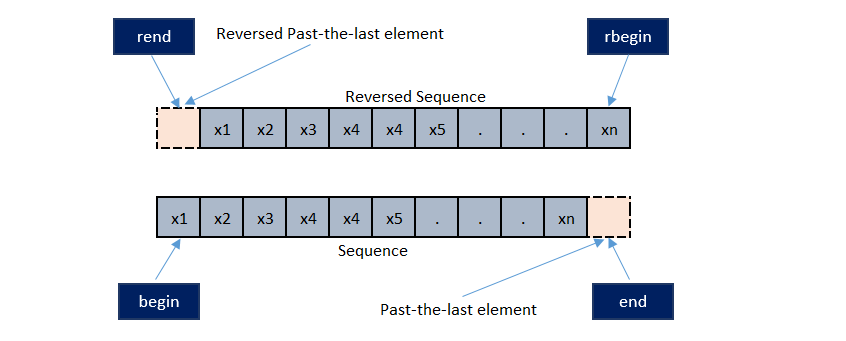C++ <iterator> - rend() Function
The C++ <iterator> rend() function returns an iterator pointing to the reverse past-the-last element in the sequence.
- Container: If the container's object is constant qualified, the function returns a const_reverse_iterator, else returns an reverse_iterator.
- Array: The function returns reverse_iterator<T*> to the reverse past-the-last element of the array.
- initializer_list: The function returns reverse_iterator<const T*> to the reverse past-the-last element of the <initializer_list>.

These function templates are defined in multiple headers which are: <iterator>, <array>, <deque>, <forward_list>, <list>, <map>, <regex>, <set>, <string>, <string_view>, <unordered_map>, <unordered_set> and <vector>.
Syntax
//container version
template <class Container>
auto rend (Container& cont)
-> decltype (cont.rend());
template <class Container>
auto rend (const Container& cont)
-> decltype (cont.rend());
//array version
template <class T, size_t N>
reverse_iterator<T*> rend (T(&arr)[N]);
//initializer_list version
template <class T>
reverse_iterator<const T*>
rend (initializer_list<T> il);
//container version
template <class Container>
constexpr auto rend (Container& cont)
-> decltype (cont.rend());
template <class Container>
constexpr auto rend (const Container& cont)
-> decltype (cont.rend());
//array version
template <class T, size_t N>
constexpr reverse_iterator<T*> rend (T(&arr)[N]);
//initializer_list version
template <class T>
reverse_iterator<const T*>
constexpr rend (initializer_list<T> il);
Parameters
cont |
Specify a container or view with a rend member function. |
arr |
Specify an array. |
il |
Specify an initializer_list. |
Return Value
Returns an iterator to the reverse past-the-last element of the sequence:
- Container: If the container's object is constant qualified, the function returns a const_reverse_iterator, else returns an reverse_iterator.
- Array: The function returns reverse_iterator<T*> to the reverse past-the-last element of the array.
- initializer_list: The function returns reverse_iterator<const T*> to the reverse past-the-last element of the <initializer_list>.
Example:
In the example below, the rend() function is used to iterate over an array to insert all elements of the array into a vector in reverse order.
#include <iostream>
#include <iterator>
#include <vector>
using namespace std;
int main (){
int arr[] = {10, 20, 30, 40, 50};
vector<int> vec;
//iterate over array to insert all elements of the
//array into an empty vector in reverse order
for(auto it = rbegin(arr); it != rend(arr); ++it)
vec.push_back(*it);
//print the content of the vector
cout<<"vec contains: ";
for(auto it = begin(vec); it != end(vec); ++it)
cout<<*it<<" ";
return 0;
}
The output of the above code will be:
vec contains: 50 40 30 20 10
Example:
Similarly, the rend() function can be used with initializer_list.
#include <iostream>
#include <iterator>
#include <vector>
using namespace std;
int main (){
initializer_list<int> ilist = {10, 20, 30, 40, 50};
vector<int> vec;
//iterate over initializer_list to insert all
//elements of the initializer_list into an
//empty vector in reverse order
for(auto it = rbegin(ilist); it != rend(ilist); ++it)
vec.push_back(*it);
//print the content of the vector
cout<<"vec contains: ";
for(auto it = begin(vec); it != end(vec); ++it)
cout<<*it<<" ";
return 0;
}
The output of the above code will be:
vec contains: 50 40 30 20 10
❮ C++ <iterator> Library


